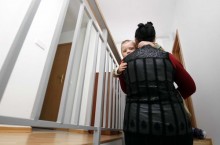Ukrainehas to ratify the Hague Convention – only then it will be possible to provide effective control of the living conditions of Ukrainian children adopted by foreigners. Such conclusion was made by Yurii Pavlenko, Children’s Ombudsman under the president of Ukraine, after his trip to the United States where he studied the situation. The United States is a country that became a home for the most adopted Ukrainian children (under the laws of Ukraine, they have Ukrainian citizenship until they turn 18) – 8,250. Italy with 6,212 adopted Ukrainian children is on the second position on this list, then goes Spain with 3,121 children, France – 1,310 children, and Israel – 907 children. In general, adopted Ukrainian children live in 34 countries.
According to the Ukrainian law, every family that adopted a child has to report (the form has been developed by national experts) about the peculiarities of adaptation, accommodation, and child’s development. In the first 1-3 years after adoption such reports have to be filed each year and then once every three years until the child turns 18.
However, these reports are not the main thing still. Monitoring adopted children is merely a formality – there are no people interested in doing it properly.
According to Pavlenko, today there is only one employee of the master Embassy assigned for over 8,000 Ukrainian adopted children, another three Consular Sections each have one part-time employee who deals with such matters. This is the number of people who work on it in the entire US. Accordingly, the adoptive parents do not put much effort into filing their reports: in 2012 44 percent of families with adopted Ukrainian children filed their reports in the United States (in 2011 there were only 28 percent of such families). The situation is not much better in other countries.
“We have to develop clear procedures for monitoring the adopted children that would be consistent with the laws of the country in which a child lives. We also have to unify case administration in all diplomatic missions that have records of adopted children. A detailed instructional sheet that would introduce standards for work of consular staff and would give clear answers on how to do various things should be developed. There is no such document at the present time and it limits the actions of the consular staff. Unfortunately, we now have a situation when a report from a family comes in but the consular officer may not always even see certain danger to the child in it. Besides, my experience with families and community organizations that help families organize social support showed that there are issues that parents do not want to put in their report so that the child would not be taken away from them (not knowing the language, new conditions, for some having family is a totally new experience). That’s why, I stress that the main task of a consular employee is to be not a warden but rather an assistant who must not only know the situation of families, but also must be able to prevent undesirable situations,” Pavlenko said.
Number of foreign adoptions in Ukraine has been annually decreasing by 20 percent (due to domestic adoptions): in 2012 Ukrainian families adopted 2,016 children, while foreigners adopted only 807. The only problem is that Ukrainian families do not want to take sick children. For example, in 2012, 60 percent of all adopted Ukrainian children went to the United States. Every fourth child is with Down syndrome, HIV infection, congenital heart disease, severe vascular defects, problems with their spine, or absence of limbs.







